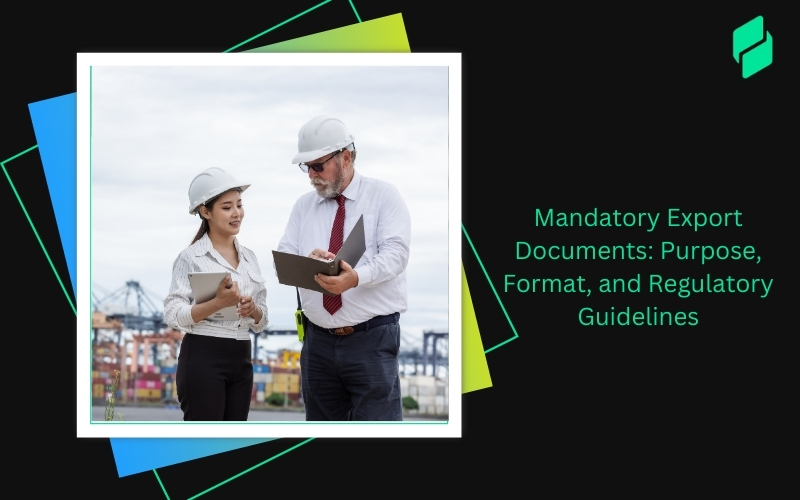Optimize your business: use unlimited savings with Pazago fulfilled now!
Get Started ->Did you know that businesses involved in import and export must meet stringent Know Your Customer (KYC) regulations before processing their shipments through Indian customs?
Delays or penalties can disrupt your supply chain without the proper customs KYC documents. Understanding these regulations is critical to ensuring smooth cross-border trade.
In India, the KYC process is a critical compliance step for individuals and companies engaged in logistics, freight forwarding, and global supply chain management. As part of this procedure, importers and exporters must provide specific customs KYC documents to verify their identity and maintain legal compliance with Indian customs laws.
1. What is KYC?

KYC, or "Know Your Customer," refers to the process by which businesses verify the identity of their clients. In the context of Indian customs regulations, KYC helps to ensure that importers and exporters are legitimate, preventing illegal activities such as money laundering or smuggling.
With valid KYC verification, businesses can avoid being flagged by customs authorities, leading to shipment delays, fines, or even a complete halt in operations.
2. KYC as a Mandatory Requirement
In India, KYC verification is not just a recommendation—it's a mandatory requirement for businesses involved in import and export. The Customs Broker Licensing Regulations, 2018 mandate that KYC documents be submitted for every shipment processed through customs. Failing to meet these requirements can have serious legal and financial consequences.
A company importing machinery into India must submit updated customs KYC documents such as their Import-Export Code (IEC) and PAN card before clearing the shipment. Missing or incorrect documents can lead to delays or penalties imposed by customs.
Also Read: Understanding Customs Clearance Fees And Procedures In India
Required Documents for Individual KYC in Customs Clearance
Individuals importing or exporting goods in India must provide specific KYC documents to verify their identity and address.
These documents are critical for maintaining compliance with customs regulations and ensuring the smooth flow of goods through ports and other entry points.
1. Permanent Account Number (PAN) Card
The Permanent Account Number (PAN) card is a mandatory document for individuals engaged in cross-border trade. This unique 10-digit alphanumeric code, issued by the Indian Income Tax Department, helps track financial transactions and serves as proof of identity.
- Why It Matters: Customs authorities use the PAN card to verify the legitimacy of the importer or exporter and to ensure that the individual complies with Indian tax laws. Without a PAN card, customs clearance will be delayed.
2. Identity Proofs: Aadhar, Passport, Voter ID, Driving License
In addition to the PAN card, individuals must provide valid identity proof to complete their customs KYC documentation. Acceptable identity proofs include:
- Aadhar Card: The most commonly accepted document, as it links to your unique biometric details.
- Passport: Especially important for those involved in international trade as it is widely recognised.
- Voter ID Card: A valid proof of Indian citizenship.
- Driving License: Often used for additional identification but may need to be supplemented by other documents.
Why It Matters: Customs authorities require these identity proofs to confirm the individual’s identity, thereby preventing fraudulent transactions in the import and export process.
3. Address Proofs Complementing KYC
Address proof is another essential element of the KYC process. Documents that serve as valid address proof include:
- Aadhar Card (if it includes your current address)
- Passport
- Voter ID Card
- Electricity Bill or other utility bills (not older than three months)
4. Additional Documents if the Shipment Address Differs from KYC
If your shipping address differs from your KYC-registered address, additional documentation will be required to verify the destination of the goods. This might include:
- Rental Agreement or lease documents
- Authorisation Letter from the property owner or tenant
- Utility Bills for the shipment location
Why It Matters: If the shipment address differs, it’s essential to provide supporting documentation to avoid delays. Customs authorities need to verify that the goods are being shipped to the correct location, particularly in the case of high-value or sensitive items.
Also Read: Best Practices for Customs Documentation and Labeling for International Shipments
Required Documents for Company KYC in India

1. Import Export Code (IEC)
The Import Export Code (IEC) is mandatory for any company engaging in cross-border trade. Issued by the Directorate General of Foreign Trade (DGFT), the IEC must identify a business in the import-export ecosystem.
- Importance: Without an IEC, customs authorities will not allow goods to pass through Indian ports, blocking the trade process.
2. Goods and Service Tax Identification Number (GSTIN)
The GSTIN is another essential document for companies. It helps to track tax payments and ensures the business complies with India’s GST laws. All businesses dealing with customs must provide their GSTIN during customs clearance.
- Why it Matters: The GSTIN simplifies the tracking of tax liabilities and payments, ensuring the company is fulfilling its tax obligations. Failure to provide GSTIN could lead to penalties or delays in customs procedures.
3. Permanent Account Number (PAN)
Every business entity in India must have a Permanent Account Number (PAN) issued by the Income Tax Department. The PAN is used for tax purposes and is mandatory for business transactions such as opening a bank account, filing taxes, and conducting financial operations.
- Why It's Needed: The PAN helps customs and tax authorities verify a company's identity and ensure it is tax-compliant.
4. Authorized Dealer (AD) Code
In addition to the core documents, companies must also provide the Authorized Dealer (AD) code. This code, registered with ICEGATE, is mandatory for customs clearance as advised by the Customs Advisory 03 /SYS/WZU/2023.
- Requirement for Companies, Proprietorship, and Partnership Firms: Businesses must submit their AD code for customs bill of entry (CBE) filings to ensure smooth transactions with foreign exchange. The AD code is critical for facilitating international payments through banks and ensuring the proper documentation of foreign transactions.
Additional Supporting Documents
Depending on the business structure, the following additional documents may be required:
- Certificate of Incorporation: This document shows that the business is officially registered with the Registrar of Companies for private limited companies.
- Address Proof: Utility bills or rent agreements prove the company's registered address.
Also Read: Decoding the Customs Act 1962: A Comprehensive Guide
Submission and Verification of KYC Documents for Customs Clearance
Ensuring timely and accurate KYC submission speeds up the customs clearance process and ensures compliance with Indian regulations.
1. Online Submission via KYC Websites
The Indian customs system has made it easier to submit KYC documents through online portals such as ICEGATE (Indian Customs Electronic Commerce/Electronic Data Interchange Gateway). This platform allows companies to digitally upload required KYC documentation, including PAN, GSTIN, and other important credentials.
- Key Benefits:some text
- Reduces manual paperwork and expedites the process.
- Ensures that data is securely transmitted to customs authorities.
- Provides a tracking mechanism for submissions, helping companies monitor the progress of their KYC verification.
2. Special Service Provider Responsibilities
Special service providers, such as Customs House Agents (CHAs), ensure that all KYC documents are submitted accurately and on time. These agents handle much of the customs clearance process, including document verification, submission, and compliance checks.
- Responsibilities of CHAs:some text
- Document Submission: They ensure all documents, including the Authorized Dealer (AD) Code, are correctly uploaded.
- Compliance Check: CHAs ensure that the submitted documents meet the required standards for customs clearance, reducing the risk of delays or rejections.
- Coordination: They coordinate between the importer/exporter and the customs authorities, addressing additional requirements or questions.
3. Power of Attorney for Clearance

Businesses may often appoint a Customs House Agent or other service provider to handle the customs clearance process. To do this, they must provide a Power of Attorney (POA). The POA grants the authorised individual or agency the legal authority to act on behalf of the business in customs-related matters.
- Why POA is Important:some text
- It allows for smoother and faster customs processes without needing direct involvement from the company for every submission.
- Ensures the authorised agent has the legal backing to deal with customs authorities.
The POA document must be submitted alongside other KYC documents. It should clearly state the responsibilities and powers granted to the agent, ensuring no legal complications during the customs clearance process.
Also Read: Essential Technical Write Up Documents Required for Smooth Customs Clearance
Customs Invoice and Special Situations
1. Required Information for Customs Invoice
A customs invoice is one of the most important documents in international shipping. It helps customs officials determine the value of goods, applicable duties, and taxes, ensuring compliance with local regulations.
Essential Information Includes:
- Description of Goods: A clear and detailed description of the shipped goods is mandatory. Ambiguity can lead to delays in customs clearance.
- HS Codes: The Harmonized System (HS) Code is an international system that classifies traded products. Every product shipped internationally needs an accurate HS code to ensure correct tariff application.
- Value of Goods: The total value of the shipped goods, broken down by item. This is essential for customs officials to calculate duties and taxes.
- Country of Origin: Identifying the country where the goods were produced or manufactured is important for trade agreements and tax calculations.
Some scenarios involve customs clearance procedures requiring additional documentation or special handling. Certain goods have unique clearance requirements due to their nature, value, or sensitivity.
Also Read: Best Practices for Customs Documentation and Labeling for International Shipments
Best Practices for Importers: Ensuring Smooth Customs Clearance
For importers in India's global trade market, managing customs KYC documents and ensuring compliance with regulations is vital. Following the best practices listed below will help streamline your customs processes and reduce the risk of delays or penalties.
1. Accurate Documentation: Ensure that all documents, such as the PAN, IEC, and AD code, are accurate. This prevents delays, penalties, or the risk of shipment seizures.
2. Contact for Assistance: For quick help with customs issues, contact Customs House Agents (CHAs) or freight forwarders.
3. Retaining KYC Records: Keep KYC records for at least five years to ensure smooth customs clearance for future shipments and compliance during audits.
Also Read: 10 Required Pre-Shipment Documents for Export Procedure and Shipping Process
Streamline Your Global Trade with Pazago: Simplified Customs Clearance and Documentation
Managing an international supply chain is a complex task, especially when dealing with the often daunting processes of customs clearance and document management.
Pazago is designed to simplify these critical aspects of global trade, enabling businesses to navigate the complexities of importing and exporting easily.

Key Features of Pazago:
1. Customs Clearance Made Easy: Pazago streamlines customs processes by automating paperwork and providing real-time updates, reducing delays and ensuring compliance with local regulations.
2. Digital Document Management: All necessary documents, such as invoices and customs declarations, are securely stored in the cloud, enabling easy access and faster responses to customs queries.
3. Real-Time Shipment Tracking: Track shipments across 180+ shipping companies, which informs you about your cargo’s status and reduces the chances of customs delays.
4. Proactive Alerts: Instant notifications about potential customs issues help businesses solve problems quickly, preventing delays and penalties.
5. Centralized Communication: Pazago unifies all communications with stakeholders, ensuring smooth coordination and faster customs processing.
Why Choose Pazago?
Pazago operates in over 110 countries, offering global coverage with local expertise. By automating customs and documentation it reduces costs by up to 20% and cuts shipment times by 50%, making it ideal for businesses looking to optimise their supply chains.
Looking to unlock seamless customs clearance and document management? 🗝️ That’s exactly what Pazago delivers. We simplify, streamline, and accelerate your import-export processes! 🚀
Ready to transform your supply chain? Visit Pazago now and experience efficient global trade operations. 🌍
Don’t just manage your logistics—master them with Pazago!


.png)


.png)





